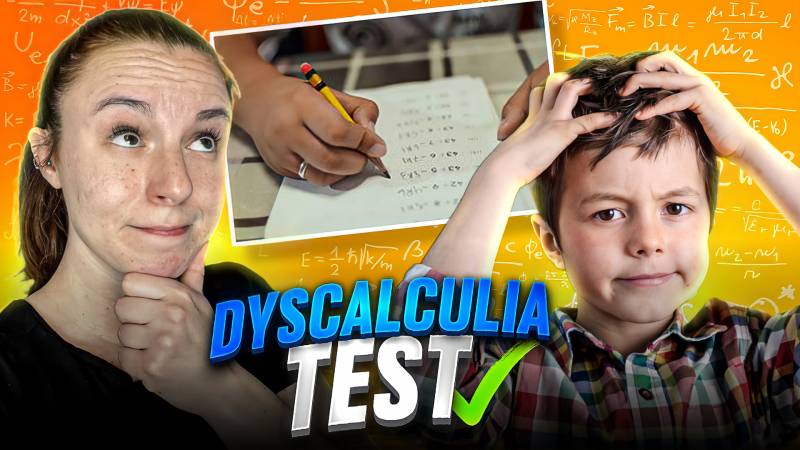
Are you concerned that you or your child may have dyscalculia? Also known as math dyslexia. Dyscalculia is just as common as dyslexia, just not as well known. So it may have been missed in school.
In this video, I will quickly cover the signs of dyscalculia so that you can decide if you need to dig deeper. If you are seeing any of these symptoms, then just click to start our free online dyscalculia test that will dive in much deeper and also give you solutions. Fill it out and you’ll be emailed a full report in minutes. To find out if you need that test, just go through this video and if you or your child are experiencing any of these symptoms simply click through to that free test.
Let’s get started. Watch the video below.
Symptoms of Dyscalculia
Preschool and Kindergarten
There are often early signs of dyscalculia even in preschool and kindergarten. Let’s go through those first. Here they are:
- A difficulty remembering the names of numbers?
- Trouble learning to count
- Trouble learning to count by two’s or threes
- Can count, but when counting objects makes mistakes
- Difficulty recognizing numbers. They may see 2’s as z’s
- May not understand that numbers stand for quantities
- May not understand the concept of more or less
- Difficulty with patterns such as smallest to largest or shortest to tallest
- May Avoid games that use numbers or dice
- May not understand that the symbol for a number and it’s written version are the same thing. In other words, the number 2 and the word two
- Just doesn’t seem to have number sense
Elementary School
In elementary school, dyscalculia becomes more obvious. Here are the signs you may see in elementary school:
- A difficulty lining up numbers when solving math problems
- Difficulty remembering addition and subtraction facts such as 2 plus 2 equals 4
- Mixes up math symbols such as the plus sign and the multiplication symbol
- Is still using fingers to count
- Struggles with math concepts such as greater than or less than
- Struggles with size concepts such as bigger and smaller or longer and shorter
- Struggles with time concepts such as before and after
- Struggles with position concepts such as right and left or over and under
- Has a difficulty learning to read the time on an analog clock
- Difficulty with time concepts such as “If it’s now 1:30 how long until it is 2 o’clock?”
- Has a difficulty learning coordination sequences such as dance moves
- Has math anxiety
- Guesses at math answers
- Loses place when counting by numbers
- Has to constantly relearn math concepts
- Can’t remember times tables
- Has difficulty with organization
- Has a difficulty understanding calendars
- Math just seems like a foreign language
- Has trouble measuring ingredients for a recipe
Key Takeaways:
High School and Adult
Once a dyscalculic is in High school or is an adult, things get even worse. Here are the signs of dyscalculia in older children or adults.
- Difficulty remembering phone numbers or dates or addresses
- Difficulty with money. This can show up when counting back change. Or a difficulty with budgeting or finances. Or splitting a restaurant bill between friends. Or even tipping
- Difficulty with directions on a map
- Difficulty following instructions
- Difficulty understanding graphs and charts
- Difficulty estimating distances and speeds. This probably won’t get you out of a speeding ticket but you can try.
- A difficulty estimating how long a task will take. Or estimating time in any way. This may show up as always being late
- Skipping over numbers when reading
If any of these are problems you or your child are experiencing then do our free deep dive dyscalculia screener.
And if your child is struggling in school, whether it’s dyscalculia or not, start them on a free trial of the Learning Success System because you’ll want to get them back on track as quickly as possible.
Do You Need help with a Dyscalculia Difficulty?
Our simple online analysis will help you get to the core of the problem and find the right solution for you.
Understanding how to help someone with a learning difficulty starts with understanding which micro-skills are affected. When you learn which of the micro-skills is the problem, you will then be on your way to solving it.
You'll also learn how to:
- Build confidence
- Enhance Learning ability
- Eliminate avoidance
- Build grit
You can get this analysis for free by filling out this simple form. This will help you get to the bottom of a learning difficulty and provide you with a solution. If you are ready to put this problem behind you click the button below and fill out the form.










